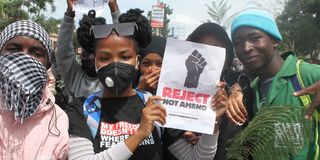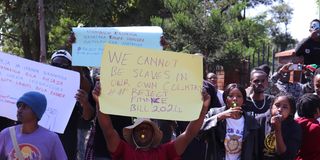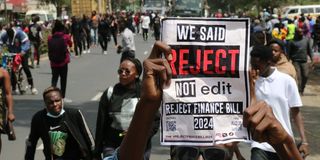How Gen Z protests redefined youth activism and politics in Nakuru

A protester holds a placard asking the finance bill to be rejected during the demos in Nakuru on June 25, 2024.
When the anti-finance bill protests began, all eyes were on Nairobi, and as expected, the demonstrations took place.
But what stood out were the faces leading the protests: young, energetic and vocal - a group later dubbed the Gen Zs.
As Nairobi set the tone for the rest of the country, the hashtag #OccupyEverywhere began to trend. Nakuru, a town traditionally quiet during national protests, soon became a focal point, with protesters being urged to gather at Nakuru Railway Station.

A protester airs their view through a placard during anti-finance bill demos in Nakuru on June 25, 2024.
Brian Silweyz, a spoken word artist, recalls June 18, when WhatsApp groups in Nakuru sprang to life with discussions around #RejectTheFinanceBill.
"I found myself in a WhatsApp group and within an hour it was full. More groups were created to accommodate others. People were strategising how to meet the next day to protest the punitive bill," he says.
For Daniel Kiptanui, a youth leader in Nakuru County, the mobilisation was unprecedented. Initially planning to travel to Nairobi with other student leaders for the protests, he was surprised by the activity in his hometown.
"On the night of June 18, there were over ten WhatsApp groups from Nakuru, all coordinating how to gather at Nakuru railway station," Kiptanui says.
Even experienced protesters like Anne Wangari were impressed by the scale of the mobilisation.
"This wasn't my first protest, but the energy around the demonstrations against the Finance Bill was on a different level," she says.
On June 20, Nakuru railway station was transformed into a hub of activity. By 10am, young men and women had gathered and began marching through Kenyatta Avenue and surrounding areas.

A youth displays reject finance bill placard during demonstrations in Nakuru.
"In Nakuru we're used to small turnouts or sometimes no protests at all," Brian notes. "But this time was different - the energy and crowd was inspiring."
Anne, who joined the march with friends, recalls the camaraderie and shared determination.
"I had never walked such a long distance before, but the enthusiasm of the crowd kept us going. It made us feel like we were part of something important," she says.
For Daniel, the protests were the realisation of a vision he had shared at a youth forum the previous year.
"I had predicted that young people would unite for a common cause and demand that their voices be heard. To see it happen was like a dream come true," he says.
The protesters' efforts paid off when the president refused to sign the Finance Bill into law. For many, it was a defining moment.
"We felt we had really made history," says Brian.
Covering the protests, it became clear to me that the Gen Zs are a force to be reckoned with. Their level of mobilisation and unity was unprecedented, especially in a city like Nakuru.
Standing on the sixth floor of Tower One, I watched as Kenyatta Avenue filled with a sea of young, determined faces - a sight never before seen in Nakuru's history.

A protester carrying a coffin during the anti-finance bill demonstration's in Nakuru.
This movement not only marked a shift in Nakuru's civic engagement, but also underlined the power of a new generation to demand change.
